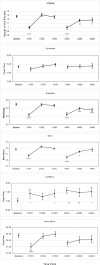Breast cancer patients have progressively impaired sleep-wake activity rhythms during chemotherapy
- PMID: 19750920
- PMCID: PMC2737573
- DOI: 10.1093/sleep/32.9.1155
Breast cancer patients have progressively impaired sleep-wake activity rhythms during chemotherapy
Abstract
Purpose: Prior cross-sectional studies have shown that cancer patients have sleep-wake activity cycles that show little distinction between daytime and nighttime, a pattern indicative of circadian disruption. This pattern is seen both before and during cancer treatment. Long-term data are needed, however, to assess to what extent circadian rhythm impairments evolve over the course of chemotherapy. The goal of this study was to assess the longitudinal course of sleep-wake activity rhythms before and during chemotherapy for breast cancer.
Patients and methods: Ninety-five women scheduled to receive neoadjuvant or adjuvant anthracycline based chemotherapy for a stage I-III breast cancer participated. The participants wore a wrist actigraph for 72 consecutive hours at baseline (pre-chemotherapy), as well as during the weeks 1, 2 and 3 (W1, W2, W3) of cycle 1 and cycle 4 of chemotherapy. Sleep-wake circadian activity variables were computed based on actigraphic data.
Results: Compared to baseline, with the exception of acrophase, all circadian rhythm variables examined, including amplitude, mesor, up-mesor, down-mesor, and rhythmicity were significantly impaired during the first week of both chemotherapy cycles. Although the circadian variables approached baseline values during W2 and W3 of cycle 1, most remained significantly more impaired during W2 and W3 of cycle 4.
Conclusion: These data suggest that the first administration of chemotherapy is associated with transient disruption of sleep-wake rhythm, while repeated administration of chemotherapy results in progressively worse and more enduring impairments in sleep-wake activity rhythms.
Figures



References
-
- Savard J, Morin CM. Insomnia in the context of cancer: a review of a neglected problem. J Clin Oncol. 2001;19:895–908. - PubMed
-
- Davidson JR, MacLean AW, Brundage MD, Schulze K. Sleep disturbance in cancer patients. Soc Sci Med. 2002;54:1309–21. - PubMed
-
- Savard J, Villa J, Ivers H, Simard S, Morin CM. Prevalence, natural course, and risk factors of insomnia comorbid with cancer over a 2-month period. J Clin Oncol. 2009 in press. - PubMed
-
- Chevalier V, Mormont MC, Cure H, Chollet P. Assessment of circadian rhythms by actimetry in healthy subjects and patients with advanced colorectal cancer. Oncol Rep. 2003;10:733–7. - PubMed
Publication types
MeSH terms
Substances
Grants and funding
LinkOut - more resources
Full Text Sources
Medical

